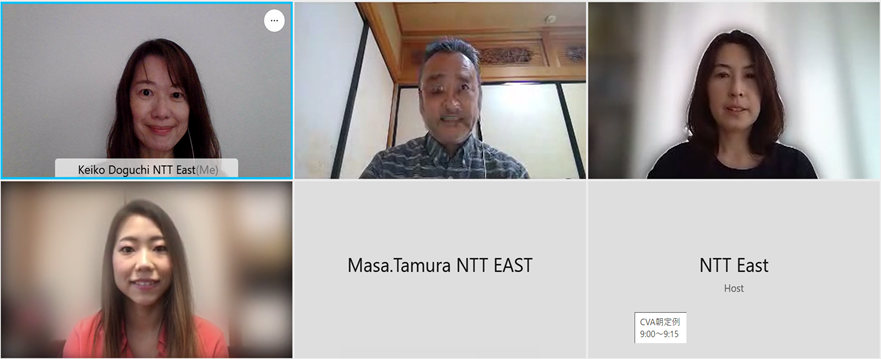For more than 2 years, NTTE, from Japan, has been a key member of the M-Sec consortium, supporting the development and testing of a technology that intends to support our cities to become smarter and, at the same time, more cyber secure. Meet the team and work behind NTTE, their role in the M-Sec Project and where will they go next
We spoke with Keiko Doguchi, Japanese M-Sec Project Coordinator, to know more about the NTTE’s role in the Project.
1. Keiko, thank you so much for agreeing with this interview. Please briefly present yourself and the company you work at.
My main background is as a business consultant, project manager at a system development company. I have been involved in EU-JP collaboration research projects since 2014 as a project coordinator and M-Sec is the 3rd project of those. I am also a management director for an SME called PortHofner, Inc in Japan. I am the project manager of IT related projects such as Furusato (hometown in Japanese) Telework project funded by the Japanese Ministry of Internal Affairs and Communications (MIC).
NTT East – the Nippon Telegraph and Telephone East Corporation (NTTE) is responsible for providing regional communication services in the eastern area of Japan. We hold a huge amount of network infrastructure facilities to support over 23 million subscriber lines. We are also providing incidental business activities to achieve the purpose of the company and to utilize the company’s resources.
2. Why have you and NTTE decided to join the M-Sec Project?
By being involved in a state-of-the-art smart city research project, we wanted to examine the possibility of networking with Japanese and European organizations and local governments and commercialize the results. Furthermore, considering that this project is related to security, we wanted to deepen our knowledge as a research on how to incorporate data utilization into business while complying with GDPR and APPI.
3. Can you also present the team that works with you for the M-Sec Project?
The team consists of six people, four of whom belong to the Regional Revitalization Promotion Department and two of whom belong to the Technical Solutions Department. We are excited to be involved in M-Sec project, which contributes to social innovation by responding flexibly and in real time to the diverse and rapidly changing issues faced by enterprises and municipalities.
4. What has been the main role of NTTE at the M-Sec Project and have you been able to achieve all you have set for? What were your and your team’s main challenges?
The main role as the coordinator of the Japanese side is to deal with NICT – Japan’s sole National Research and Development Agency specializing in the field of information and communications technology, organizing the Japanese consortium and preparation of documents submitted to NICT. In the field trials of Use Case 4 and Use Case 5 in Fujisawa, Japan, we are negotiating with stakeholders and making various preparations for the implementation of the field trials. In addition, we are also involved in the dissemination activities of WP5, such as creating a comic book and participating in webinars.
Many things have been delayed in the pandemic situation. But even then we focused on the dissemination activities that we could carry out, such as introducing M-Sec in a webinar of Japan ITU Association, contributing to an online magazine published by the association, and creating a comic book. And for the field trials, with the postponement of planned gastronomic events, it was very challenging to change the scenario of the field trial to fit the current pandemic situation.
5. Looking back on what you and your team have done in the scope of the M-Sec Project, what are your main takeaways?
This project has taught us many lessons by moving forward in a pandemic situation. In particular, we learned a lot about how to communicate when we cannot see each other face to face. Also, we are aiming to have a field trial that is applicable to the pandemic by flexibly proceeding even under such circumstances.
6. With only a few months until the end of the project, on what major developments do you and your team still need to focus? Do you feel confident?
As we are still in the middle of the process, we cannot be 100% confident that the data obtained from the field trial will be analysed and used for the implementation of the cross border trial. In addition, based on the lessons learned from the feedback from Fujisawa City and stakeholders, we will continue to further improve and evolve the field trial to solve the issues to achieve the goal utilizing our previous EU-Japan project experiences.
7. Did you find this experience of participating in an EU-JP partnership rewarding?
It is a good opportunity to collaborate and coordinate with different organizations in the EU and learn about technology trends and people’s interests, especially in foreign countries. In the future, it will also be possible for us to collaborate with the organizations that participated in this project and conduct other projects with them.
With the recent focus on regional revitalization in Japan, and cities becoming to shift to be smarter, our experience in the smart city project is fascinating. Especially the joint project with the EU, where we can get a lot of information from other countries. We would like to contribute with our experience in M-Sec to the future smart city project in Japan.


